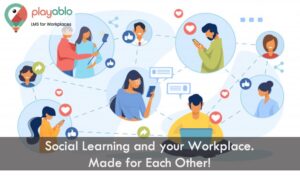
Have you noticed how quickly we come up with solutions when a friend or a neighbour brings up issues related to their romantic relations or tensions at work? But at the same time, we might struggle to work through our problems. Well, this principle applies to workplace learning as well. Employees usually consult their colleagues when there is a need to solve problems at work. And this is where the concept of social learning comes in. Organisations can reap the benefits of this natural trait among their staff members to promote social learning to embed it in their workplace culture.
So, What is Social Learning? How is it Beneficial?
Social learning is the combination of collecting and sharing information learned from peers and social media. And it may be the way a fast-growing segment of the workforce prefers to learn. As per a recent report, “Millennials will make up 75 per cent of the workforce by 2020. Experts predict this group will be far less likely to relate to training manuals, silos or “top-down” learning.” As explained by Iain Scholnick, CEO of Braidio, “Employees can use social media to find colleagues with similar experiences and informally circulate helpful information about what consumers want, fix issues that may arise, and advance their organisations.” He further added: “I want to be able to solve a problem when I need to solve a problem, not do training six months before the problem arises.”
Yes, social learning leads to the development of instant problem-solving skills. What happens is, when employees work in silos, you rely on that ‘top-down’ learning experience. Here, your workforce does not engage with customers and peers. But your learning changes based on day-to-day workflow. So, when you create training modules based on interactions, you understand what’s happening with your clients or stakeholders.
Here Are Some Additional Data to Prove the Benefits of Social Learning
As per the 2017 Global Human Capital Trends report from Deloitte, global corporate learning platforms are altering their communications platforms since their workforce is now more reliant on social media for immediate answers. The survey was conducted for more than 10,000 HR professionals and business leaders across 140 countries. The findings state the inevitable — “32 per cent of companies are becoming more team-oriented and connected with social media to keep up with a more digital, diverse and social technology-savvy workforce.”
The report further adds: “High-performing companies often first develop these flexible models at the ‘edge’ of the company. To make further progress, they focus on building a new leadership mindset that rewards innovation, experimentation, learning, and customer-centric design thinking. In short, if what a company needs to know and do is constantly changing, then the organization’s structure must change as well.”
Now, How Can You Tap the Advantages of Social Learning?

Embrace Change
Think about ways typically slower operating models can be sped up to keep up with digital demands. Keep in mind that strategy, connectedness, customers, and talent pools are continually changing.
Consider Talent Mobility
Executives should move from function to function to understand the newer and more agile career models. Support team fluidity to help members quickly return to their home team or move to new teams after completing their tasks.
Build a Core Performance Group
Get feedback from group interviews and analysis and grasp how higher-performing teams, projects, and programs work. You can achieve a more bottom-up model for business units by looking at company job titles, reward systems, and career paths.
Think About New Communication Platforms
Rather than relying on old communication platforms, take the help of emerging technologies like Workplace, Slack, Basecamp, Asana, Trello, Workboard and others. Then make them the standard in the organisation’s core ERP/HRMS infrastructure.
Embrace Feedback-based Performance Management
Embrace regular feedback to encourage higher and continuous goal setting, project changes, and the feeling of reward for workers. Employees should feel appreciated for their efforts. Employee survey tools are suitable for direct input for manager performance. These tools also promote transparency.
Are There Any Downsides of Social Learning?
Social learning has an egalitarian nature, and hence, it is so attractive to the modern workforce. But there are certain downsides to this approach as well — if not followed correctly. As explained by Tyler Riddell, principal at Peritus Marketing, “Without an ‘expert,’ discussions can go awry rather quickly if not guided in the right way.” Added Sherry Engel, vice-president of learning and talent development at MRINetwork, “The biggest downside I see of social learning is individuals learning ‘the exception’ before learning ‘the rule’. When onboarding a new employee to a new skill set, you typically need to lay a foundation of knowledge. That is best done through formal online learning platforms. Once you have the basics, you network and share best practices on how to maximize those basics, what exceptions you can make to those basics, etc.”
Nate Masterson, director of HR at Farmington, explained: “There is only a downside to social learning if your organisational culture is toxic or if specific employees are dealing in the exchanging of bad or harmful ideas. Ultimately, social learning works in all ways—it can help share constructive and meaningful ideas in the same way as harmful or toxic ideas. One can mitigate this risk by conducting a careful hiring process and bringing only high-character employees on board.”
Conclusion
Yes, we cannot do away with top-down learning entirely. The suitable learning model is a combination of both approaches. As explained by Lee Ryan, owner and designer of Design Room, “I think it is still best to initiate top-down learning now and then as not all of the new skill sets will be taught if we solely depend on social learning. We will only be launching top-down learning when it is in dire need at the company.” Do you want to know more about implementing social learning in your organisation? Then, our experts at PlayAblo are just a call away!

